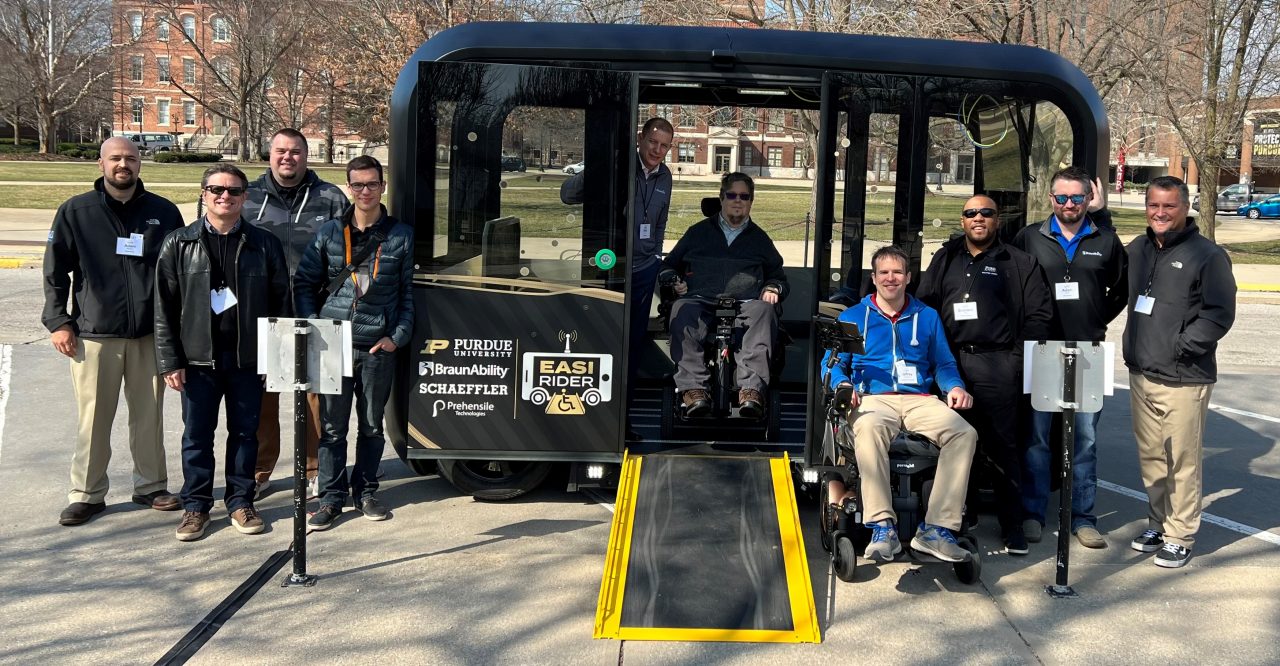USDOT Announces Winners of its First-Ever Inclusive Design Challenge on Anniversary of ADA

WASHINGTON – Today, during an event held in recognition of the ADA’s 32nd anniversary, the U.S. Department of Transportation (USDOT) will announce the winners of its $5 million Inclusive Design Challenge, a competition focused on innovative designs to enhance mobility options for people with physical, sensory, and cognitive disabilities and to provide equal access to automated vehicles. The first place prize of $1 million was awarded to Purdue University, the second place prize of $700,000 was awarded to AbleLink Smart Living Technologies, and the third place prize of $300,000 was awarded to the University of Maine.
The USDOT created the Inclusive Design Challenge to spur innovation in automated vehicle accessibility, encourage collaboration, and explore new designs and technologies. The program draws on the expertise of the disability community, researchers, advocates, and entrepreneurs, tapping into their knowledge and creativity to promote greater access and shape the future of mobility.
“Automated vehicles have the revolutionary potential to help seniors and people with disabilities get around more easily—but we must ensure that accessibility is part of the conversation from the very beginning,” said U.S. Transportation Secretary Pete Buttigieg. “That’s why DOT started the Inclusive Design Challenge, and we’re thrilled to award these inaugural winners funding to help advance their innovative ideas and improve transportation for people with disabilities.”
The challenge consisted of two stages – an initial written proposal describing the design solution with ten semifinalists selected; and a second stage for semifinalists to develop prototypes of their concepts. Each of the ten semifinalists received $300,000 and the remaining $2 million was distributed to the three winners. USDOT will continue to engage with the Inclusive Design Challenge participants as they advance their innovations.
The winners for the challenge are:
First Place - Purdue University ($1 million)
- Project: Efficient, Accessible and Safe Interaction in a Real Integrated Design Environment for Riders with disabilities (EASI RIDER)
- https://youtu.be/gw0JJhihNE4
The team at Purdue University developed an automated vehicle that incorporates universal design features to accommodate people with physical and sensory disabilities. The vehicle features an in-floor ramp design, an automatically deploying “Smart Ramp,” an automated wheelchair docking system, and an on-board user-interface that provides features catering to a wide range of disabilities. The product assists users in locating an automated vehicle, boarding and exiting the vehicle, securing themselves and their mobility aids, and interacting with the vehicle via touch screen and voice control.
Second Place - AbleLink Smart Living Technologies ($700,000)
- Project: WayFinder ADS – Enabling Independent Use of Autonomous Vehicles by Individuals with Cognitive Disabilities and others with Special Needs
- https://youtu.be/jUzbwuOQFw8
The AbleLink Smart Living Technologies team developed an accessible travel technology entitled WayFinder ADS System. It is a comprehensive mobile application that connects users with automated vehicles to allow them to travel independently to predetermined destinations. The application includes a cloud program that would allow a family member or travel trainer to track the individual while they are traveling in and interacting with the vehicle. The application also includes educational programs to orient users on the use and function of automated vehicles in a safe, virtual environment.
Third Place - University of Maine ($300,000)
- Project: Autonomous Vehicle Assistant (Ava): Ride-hailing and localization for the future of accessible mobility
- https://youtu.be/syIlBlFSgSo
The University of Maine’s team developed “Ava,” the Autonomous Vehicle Assistant. It is a smart phone app designed to assist passengers with visual impairments and older adults with trip planning, travelling to pick-up locations, and boarding vehicles. The app allows users to hail an autonomous vehicle and then get to that vehicle while avoiding any obstacles in their path using a visual user interface, natural language text to speech, and augmented reality.
With the 32nd anniversary of the Americans with Disabilities Act (ADA) being recognized this week, the Inclusive Design Challenge is one of the ways the Department of Transportation is committed to advancing equity in transportation, a top priority of the Biden-Harris Administration. The Department also announced the first-ever Bill of Rights for Passengers with Disabilities earlier this month, as well as a notice of funding opportunity for the All Stations Accessibility Program (ASAP) to improve accessibility at transit stations.
